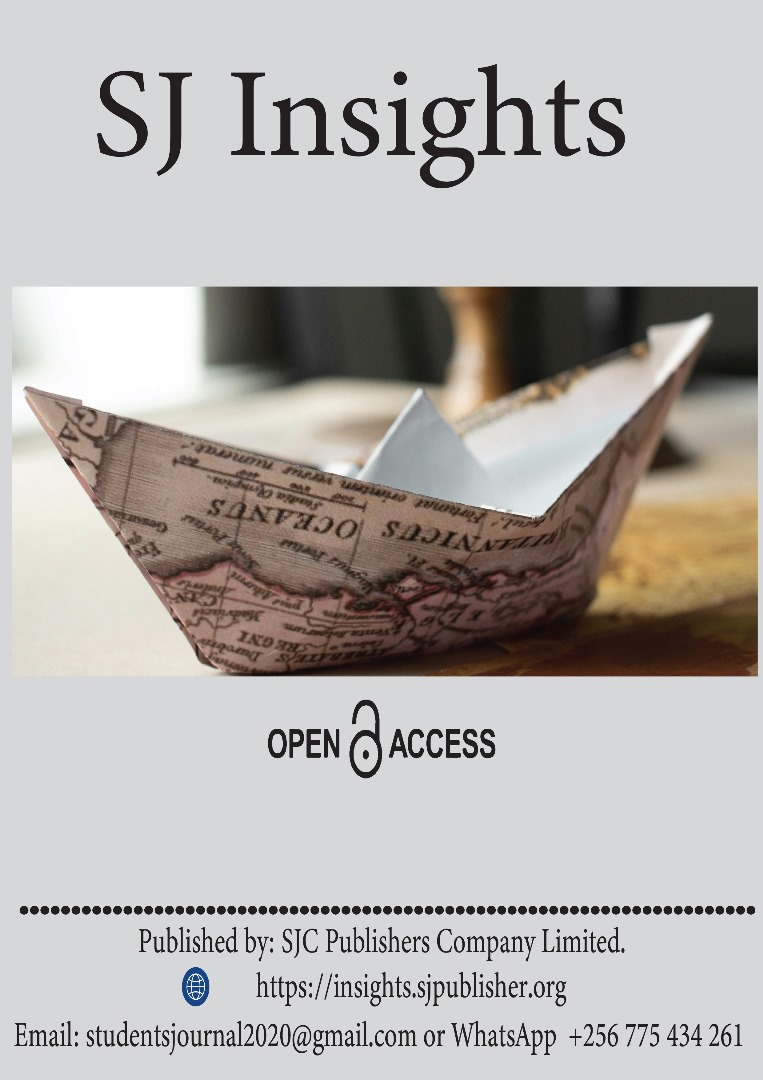A Cross-Sectional Study on the Effect of Saltwater Intrusion on Saro Rice Farming in Tovuni Kiungoni, Zanzibar, Tanzania.
DOI:
https://doi.org/10.51168/insights.v2i10.32Keywords:
Saltwater intrusion, Saro rice farming, Soil salinity, Tovuni Kiungoni, Zanzibar agricultureAbstract
Background.
Saltwater intrusion poses a significant threat to agricultural productivity in coastal regions, particularly in Tovuni Kiungoni, Zanzibar, where Saro Rice Farming is a vital economic activity. This study investigated the effects of increasing salinity on rice cultivation, focusing on changes in soil salinity, crop yield, and farmer adaptations.
Methodology.
Through field surveys, soil sampling, and interviews with local farmers, the research identifies key contributors to escalating salinity in irrigation water, including rising sea levels and unsustainable water management practices.
Results
34% of the respondents were aged 60 years and above, and Females dominated the study at 62%. The findings reveal that elevated levels of sodium (Na⁺) and chloride (Cl⁻) ions exceed thresholds for optimal rice production, causing osmotic stress, reduced germination, stunted plant growth, and lower yields. Additionally, soil sodicity degrades soil structure, reduces infiltration, and exacerbates these challenges. Farmers have adopted strategies such as salt-tolerant rice varieties, improved irrigation techniques, and leaching practices, but their effectiveness is hindered by limited resources and knowledge.
Conclusion.
Elevated levels of sodium and chloride in irrigation water not only reduce the osmotic potential, making it difficult for crops to absorb water but also lead to soil degradation through sodicity. These effects ultimately compromise crop yields and agricultural sustainability in the region.
Recommendation.
There is an urgent need for integrated water resource management, sustainable agricultural practices, research on resilient crop varieties, and enhanced support systems to bolster farmer resilience. Collaborative efforts among stakeholders are essential to safeguard Saro Rice Farming, ensure food security, and address the growing impacts of climate change and environmental degradation in the region.
References
Food and Agriculture Organization (FAO). (2020). Sustainable rice production in Africa. Rome: FAO.
Food and Agriculture Organization (FAO). (2021). Managing salt-affected soils for sustainable agriculture. Rome: FAO.
Guimond, J. A., and Michael, H. A. (2021). Effects of marsh migration on flooding, saltwater intrusion, and crop yield in coastal agricultural land subject to storm surge inundation. Water Resour. Res. 57 (2), e2020WR028326.
Intergovernmental Panel on Climate Change (IPCC). (2022). Climate Change 2022: Impacts, Adaptation, and Vulnerability. Cambridge: Cambridge University Press.
IPCC (2019). “Summary for policymakers,” in Climate change 2007: the physical science basis. Contribution of working group I to the fourth assessment report of the intergovernmental panel on climate change (Cambridge, United Kingdom and New York, NY, USA: Cambridge University Press).
IPCC (2023). Climate change 2013: the physical science basis. Contribution of working group I to the fifth assessment report of the intergovernmental panel on Climate Change. Cambridge, United Kingdom and New York, NY, USA: Cambridge University Press.
IPCC (2024). Climate change 2014: mitigation of climate change. Cambridge. United Kingdom and New York, NY, USA: Cambridge University Press.
Moshi, E., Lema, N., & Salum, A. (2021). Agricultural transformation in Zanzibar: The role of improved rice varieties. African Journal of Agricultural Research, 16(3), pp. 201-210.
Boonwichai, S., Shrestha, S., Pradhan, P., Babel, M. S., & Datta, A. (2021). Adaptation strategies for rainfed rice water management under climate change in Songkhram River Basin, Thailand. Journal of Water and Climate Change, 12(6), 2181–2198. https://doi.org/10.2166/wcc.2021.220
Ingrao, C., Strippoli, R., Lagioia, G., & Huisingh, D. (2023). Water scarcity in agriculture: An overview of causes, impacts, and approaches for reducing the risks. Heliyon, 9(8), e18507. https://doi.org/10.1016/j.heliyon.2023.e18507
Liu, S., Cui, S., Adamowski, J. F., Wu, N., Wu, M., Zhang, P., & Cao, X. (2024). Assessing the impact of various irrigation technologies on agricultural production: A water-energy carbon nexus perspective. Science of The Total Environment, 954, 176809. https://doi.org/10.1016/j.scitotenv.2024.176809
Modi, R. (2019). The Role of Agriculture for Food Security and Poverty Reduction in Sub-Saharan Africa. In T. M. Shaw, L. C. Mahrenbach, R. Modi, & X. Yi-Chong (Eds.), The Palgrave Handbook of Contemporary International Political Economy (pp. 391–410). Palgrave Macmillan UK. https://doi.org/10.1057/978-1-137-45443-0_25
Omar, M. M., Shitindi, M. J, Massawe, B. H. J, Fue, K. G, Meliyo, J. L, & and Pedersen, O. (2023). Salt-affected soils in Tanzanian agricultural lands: Type of soils and extent of the problem. Sustainable Environment, 9(1), 2205731. https://doi.org/10.1080/27658511.2023.2205731
Su, Q., Kambale, R. D., Tzeng, J.-H., Amy, G. L., Ladner, D. A., & Karthikeyan, R. (2025). The growing trend of saltwater intrusion and its impact on coastal agriculture: Challenges and opportunities. Science of The Total Environment, 966, 178701. https://doi.org/10.1016/j.scitotenv.2025.178701
Yadav, M., Vashisht, B. B., Jalota, S. K., Jyolsna, T., Singh, S. P., Kumar, A., Kumar, A., & Singh, G. (2024). Improving Water Efficiencies in Rural Agriculture for Sustainability of Water Resources: A Review. Water Resources Management, 38(10), 3505–3526. https://doi.org/10.1007/s11269-024-03836-6
Downloads
Published
How to Cite
Issue
Section
License
Copyright (c) 2025 Eric Niringiyimana, Abdi Mzee Kitwana, Henry Stanley Mbowa

This work is licensed under a Creative Commons Attribution-NonCommercial-NoDerivatives 4.0 International License.




